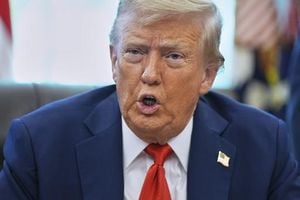In a dramatic escalation of tensions between the United States and Mexico, the Trump administration has deployed significant military assets to the southern Caribbean and along the US-Mexico border, signaling a new phase in Washington’s war on Latin American drug cartels. The move, which comes amid fierce debate over sovereignty and security, has rattled political circles on both sides of the border and raised questions about the future of US-Mexico relations.
According to The Economic Times, on August 24, 2025, the USS San Antonio, USS Iwo Jima, and USS Fort Lauderdale—three US Navy warships carrying a combined 4,500 service members, including 2,200 Marines—were scheduled to arrive off the coast of Venezuela. The deployment, part of what sources describe as a broader effort to counter threats from so-called “narco-terrorist organizations,” is the latest in a series of moves aimed at curbing the influence of powerful drug cartels in Latin America. The Trump administration has made cracking down on these organizations a central pillar of its national security and immigration strategy.
“The United States has ordered an amphibious squadron to the southern Caribbean as part of the same effort,” The Economic Times reported, citing anonymous government sources. The ships’ mission, while not detailed publicly, is widely believed to be linked to the recent US designation of Mexico’s Sinaloa Cartel and Venezuela’s Tren de Aragua as global terrorist organizations in February 2025. This step, unprecedented in its scope, has paved the way for more aggressive US action against cartels operating in the region.
Further reinforcing the US military presence, the USS Lake Erie, a guided missile cruiser, and the USS Newport News, a nuclear-powered fast attack submarine, are expected to arrive in the region by early the week of August 26, 2025. These deployments underscore the seriousness with which the Trump administration views the threat posed by Latin American drug cartels and represent a significant show of force just miles from US shores.
But the military buildup is only one aspect of a rapidly intensifying standoff. On August 21, 2025, US Drug Enforcement Administration (DEA) Administrator Terrance Cole, in an interview with Fox News, refused to rule out the possibility that President Trump might authorize direct bombing of Mexican drug cartels. “I know that decision lies with the president. The men and women of the DEA will support the decision that comes from the president. We will complete the mission, but let’s remember we have been at war with these cartels for the last 40 years. The men and women of DEA have been consistent, they’ve been at the forefront, they’ve been at the tip of the spear, this is what we do and we will continue to support the mission and the orders that come down from the president of the United States,” Cole stated.
The remarks sent shockwaves through Mexico’s political establishment. The following day, Mexican President Claudia Sheinbaum issued an emphatic denial that such strikes would ever take place. “No,” Sheinbaum declared, pausing for effect. “Mexico is a free, independent and sovereign country, and no foreign government would dare to violate our sovereignty. It’s not like before. Mexico has a lot of strength — national and international [strength] because of our people, because of what we represent as a government of the people. So, no, that won’t happen.”
Sheinbaum further revealed that Mexico’s Foreign Minister Juan Ramón de la Fuente had conveyed to US Ambassador Ronald Johnson that all information exchanged between the two nations on security matters “has to be within the framework” of agreed cooperation. According to Sheinbaum, “the ambassador agreed,” but she was adamant that Mexico had not signed on to any such US initiative.
Nevertheless, Sheinbaum warned that any US strike on Mexican territory would be considered an “act of war.” Drawing on patriotic sentiment, she said, “as I’ve said: any attempt, we have the national anthem, [heaven gave you a soldier in every son].” She emphasized Mexico’s longstanding foreign policy of self-determination for all Latin American and Caribbean nations, not just her own country.
Despite these strong words, the reality on the ground is more complicated. On August 12, 2025, the Sheinbaum administration handed over 26 drug lords, including several Sinaloa Cartel kingpins, to US authorities for prosecution—a move that follows a similar handover of 29 high-profile cartel figures in February. Yet, as political analysts point out, such gestures have done little to deter US pressure. In fact, they may have emboldened Washington to push for even more assertive measures.
US military commands are now reportedly preparing for potential unilateral action inside Mexico. As of late August, nearly 10,000 US troops are deployed along the border, and both the US Northern Command (NORTHCOM) and its Special Operations component (SOCNORTH) have been directed to finalize plans for possible air and drone strikes against cartel targets by mid-September 2025. These operations, according to sources cited by journalist Ken Klippenstein, would be conducted without the approval or participation of the Mexican government.
Within the Trump administration, there is a growing consensus for direct intervention—or even outright invasion—of Mexico. Key officials, including Vice President Vance, Attorney General Pam Bondi, and Defense Secretary Pete Hegseth, have all voiced support for robust action. Bondi, responding to questions from Republican Senator Lindsey Graham, said, “We will not be intimidated and we will keep America safe because of President Trump’s leadership. Not only against Iran, but also against Russia, China and Mexico. In the face of any foreign adversary, whether it tries to kill us physically or by overdosing our children with drugs, we will do everything in our power, thanks to his [Trump’s] leadership, to keep America safe.”
The stakes extend beyond drug enforcement. According to testimony from US Air Force General Gregory Michael Guillot, NORTHCOM’s relationship with its Mexican counterparts has grown “robust and expanding,” though it had previously been sidelined in direct operations. The US has also ramped up efforts to counter Chinese influence in Latin America, seeking to reassert its strategic dominance over key resources and trade routes, including the Panama Canal and the increasingly important interoceanic corridor across Mexico’s Isthmus of Tehuantepec.
Meanwhile, Mexico’s ruling Morena party is struggling to maintain unity amid mounting economic and political pressures. Economic growth has stagnated, with GDP rising just 0.6% in the second quarter of 2025. Public spending cuts have led to a slowdown in job creation, and uncertainty over the future of the US-Mexico-Canada trade agreement (USMCA) has chilled investment. On July 31, President Sheinbaum negotiated a temporary 90-day reprieve from Trump on a threatened 30% tariff hike, but the underlying tensions remain unresolved. As Trump bluntly stated on social media, “We will be talking to Mexico over the next 90 Days with the goal of signing a Trade Deal somewhere within the 90 Day period of time, or longer.”
US pressure has sent “ripple waves across Morena and among its different tribes,” according to Arturo Sarukhán, former Mexican ambassador to Washington. The result: shrinking political space for Sheinbaum and a ruling class increasingly caught between American demands and domestic dissatisfaction. In response to the security crisis, the Mexican Senate recently approved legislation placing the National Guard under the command of the Ministry of National Defense—a shift from civilian to military leadership aimed at combating organized crime more forcefully.
As both nations brace for what may come next, the battle lines are drawn not just over drugs and borders, but over national sovereignty, economic survival, and the balance of power in the Western Hemisphere. The coming weeks may well determine whether this standoff remains a war of words—or becomes something far more dangerous.




